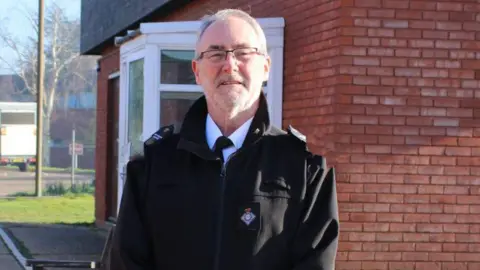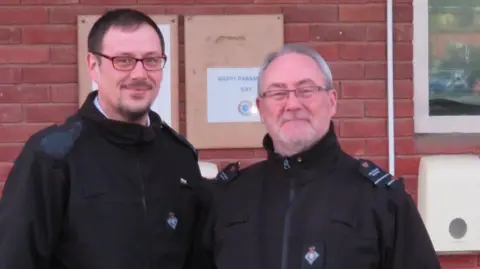Prisons changed for the better - retiring officer
 PA Media
PA MediaPrisons have changed considerably, but for the better, says the UK's longest-serving prison officer Steve Ley.
The west London prison officer joined HM Prison and Probation Service (HMPPS) aged 21 and after 50 years of service is preparing to retire.
Mr Ley, 71, said he dedicated his career to keeping prisons safe and supporting rehabilitation, and witnessed how the justice system evolved over five decades.
Although there have been difficult times, such as witnessing deaths in custody, Mr Ley has seen many prisoners go "back out into the community" and hopes they are living "fulfilling" lives.
'Proud of what I do'
He started working at Ashford Prison in 1975 and lived in quarters before it closed in 1987. He then moved to HMP Feltham, followed by HMP Whitemoor, High Down Prison and HMP Feltham again, where he stayed for the remainder of his career.
Mr Ley said the prison service had transformed during his working life, from the 1970s when prisoners used chamber pots to today's prisons where inmates are given access to televisions and phones.
"Things have changed considerably but it's all for the better," he said.
 PA Media
PA MediaThe father-of-two said: "When I joined the prison service, one of the very first jobs you do as a young officer is you supervise the toilets because, in those days, they didn't have integral sanitation.
"So you would stand there and they'd be coming up with their chamber pots and it was awful.
"It was demoralising for them and for us – and that's all gone, that's all changed."
Mr Ley said the changes over the years have given back "some control" to prisoners and encourage good behaviour.
"We should be looking after them and helping," he said. "We're not here to punish people, the courts have done that, that's not our role.
"Our role is to look after them while they're in prison and hopefully send them out at the end of their sentence having transformed."
Mr Ley said that while working at Ashford Prison, a group of young prisoners found out he had welcomed his first child and they made cards to congratulate him and his wife.
He said: "It's most unusual to get that response from people, even friends outside, so for these boys who were locked up prisoners, it was amazing."
Mr Ley said the "lowest points" in his career were witnessing two deaths in custody.
"No matter what somebody's done, they don't deserve that," he said.
Reflecting on his career Mr Ley said: "When I first joined the job, we very rarely told people what we did for a living.
"Prison staff, at that time, didn't have a very good reputation – people had these fixed ideas of who and what we were.
"Now, I'm not ashamed to admit what I do for a living. I'm proud of what I do… and I think I have made a difference."
Mr Ley says working in prisons has made him more tolerant and a better listener, and is encouraging anyone to apply to the prison service.
His son followed in his footsteps and joined in 2006.
"The prison service is daunting… but everybody's got something they can offer," he said.
The charity Howard League for Penal Reform has said while there has been some progress in conditions over the decades prisons in England and Wales are in crisis.
Andrew Neilson from the charity said: "Overcrowding, inadequate staffing, and lack of resourcing are contributing to a failing system where the needs of people in prison are overlooked and unmet."
The charity also says rehabilitation is essential to help people turn their lives around.
"Rather than engaging people in activities that help rehabilitation, such as exercise, education, employment and training, our overcrowded and under-resourced system sees people crammed in a cell for 23 hours a day with nothing to do, at a time when the physical state of prisons is getting worse," said Mr Neilson.
"This makes reoffending more likely, not less likely."
Listen to the best of BBC Radio London on Sounds and follow BBC London on Facebook, X and Instagram. Send your story ideas to [email protected]
